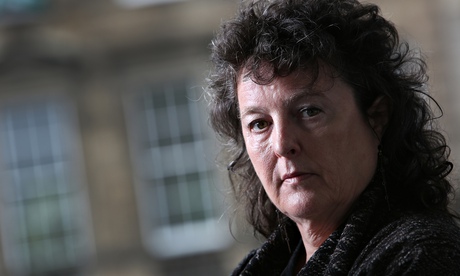
Of all the honours in this week’s New Year list, the Damehood bestowed on Carol Ann Duffy seems most timely. Not just because of her indefatigable record in responding to public events over the five years of her tenure as poet laureate, but because the Christmas holiday period has been so particularly productive for her.
Every year since 2008 she has published a Christmas poem and each one differs. In Mrs Scrooge (2008) and Wenceslas (2012), both published in the Guardian, she explores a time of material indulgence. The ascetic Mrs Scrooge and the Falstaffian King Wenceslas could not be more different in their celebrations of Christmas.
King Wenceslas has an almighty Christmas pie cooked for him and the majority of the poem is dedicated to its description:
“Within the Goose,
perfumed with Fruits, was a Duck,
and jammed in the Duck, a
Pheasant,
embalmed in Honey”
Duffy’s poetry is ambivalent towards the pleasures of gastronomic excess. The sensuousness of her language implicitly celebrates the pie, even while verbs such as “jammed” and “embalmed” hint at something less savoury. At the end she restores goodness to Wenceslas by allowing him to share a slice of his pie with a “Pauper”.
The widowed Mrs Scrooge is a much less ambivalent character: a conscientious social campaigner leafleting the public on Christmas Eve and calling: “Find out how turkeys really die!” The disgruntled shoppers she encounters are “pushing trolleys crammed with breasts, legs, crowns, eggs …” This list continues rapidly until Duffy drops the line “all done on credit cards” and sends Mrs Scrooge home to her soup.
Her ensuing reverie of Christmases past, present and future teach her to lighten up and submit to the lyrical imagination. At the end of this quirky Dickensian fantasy, the “the credit crunch ha[s] forced the property developers/ to sell the empty flats below to the Fezziwig girls!” and our earnest widow joins the rest of the cast of A Christmas Carol for a glass of Buck’s Fizz.
Mrs Scrooge’s shoppers yell “Spoilsport! Ho! Ho! Ho!” and Duffy received a similar response to her 2009 poem Twelve Days of Christmas, published in the Radio Times. Described by the Telegraph as “staggeringly joyless”, it is the most overtly polemical of her Christmas poems, opening:
“On the first day of Christmas, a buzzard on a branch.
In Afghanistan, no partridge,
pear tree; but my true love sent to me a card from home.”
The five gold rings become”bankers’ profits fired in greed”, “The second ring outshone the sun, fuelled by carbon, doused by none”, the third: “black gold, O for oil – a serpent swallowing its tail”, the fourth: “Celebrity; Fool’s Gold, winking on TV” and finally ring five, “religion’s halo, slipped – a blind for eyes or gag for lips.”
Duffy’s festive offering the following year, Snow (2009), was entirely different. Lacking political charge, it is both mellow and sharply-observed, displaying her keen ear for the music of language. It opens:
“Then all the dead opened their cold palms
and released the snow; slow, slant, silent,
a huge unsaying, it fell, torn language”
Dorothy Wordsworth’s Christmas Birthday, this year’s Christmas poem, is a joyful and deceptively simple poem which returns to the territory of her early collection The World’s Wife in celebrating the female relative of a famous man from history. Duffy uses the happenstance of Dorothy’s birthday falling on Christmas Day to reflect on the transience of happy moments, the permanence of written verse, and the relation between the two. At the end of the poem carollers arrive at the door of Dorothy, William and Samuel Taylor Coleridge: “Loud boots at the porch/and a stout thump on the door/as the Minstrels come.” The line is resonant of Wordsworth’s short Christmas-themed poem Minstrels, published in 1820 two decades before he became poet laureate.
From the short lyric, to the character narrative, to the subverted carol, Duffy draws upon the traditions of both religious and secular verse to create something new, a public poetry that avoids the cliches of Christmas.
War, for instance, finds its way into Twelve Days of Christmas, with its recurrent sadness for the “dead soldier’s lady”, and again in her 2011 Armistice Day poem, The Christmas Truce.
Twelve Days proved that poetry is still capable of creating a political storm. And Duffy is not afraid of such controversy, as she showed this year with her involvement in protests against library closures, and the embargo on prisoners receiving books (the latter eventually ruled illegal in the high court).
At a time of year when confected sentiment is so rife it’s particularly apt to honour a laureate who so energetically challenges Auden’s oft-quoted line “poetry makes nothing happen”.

